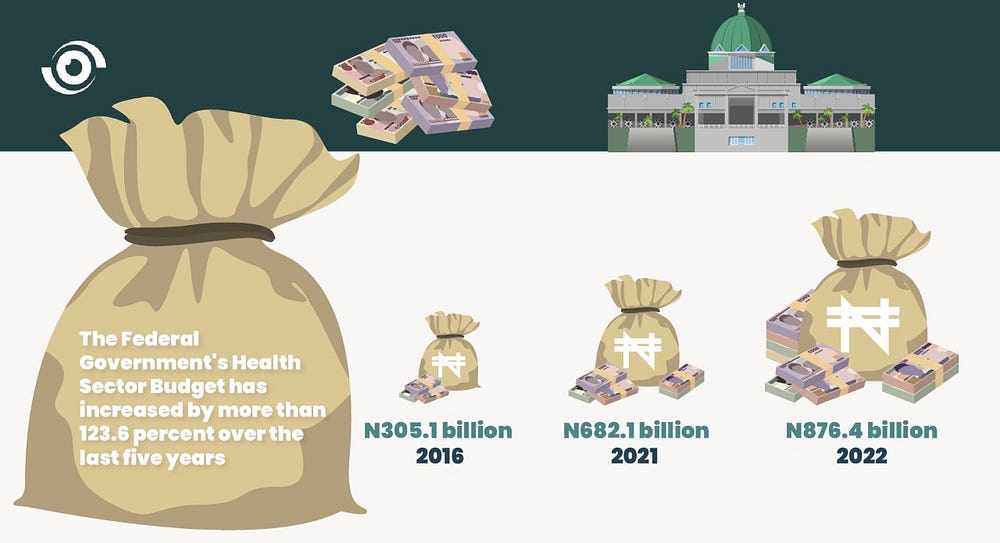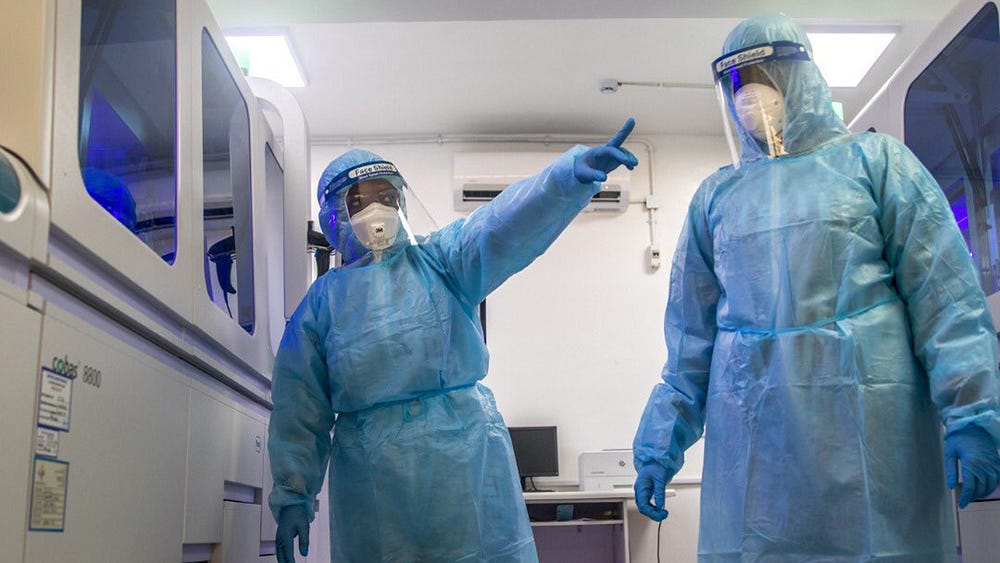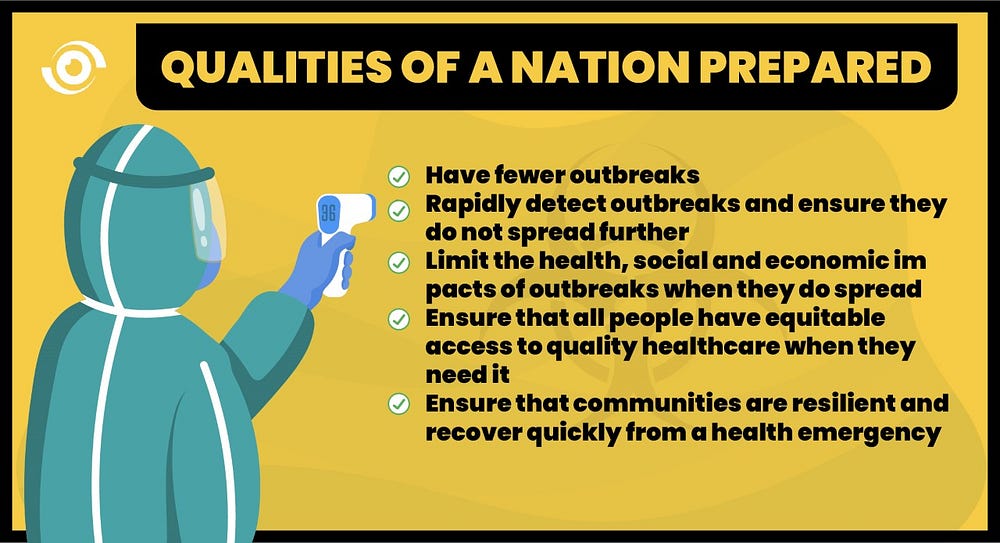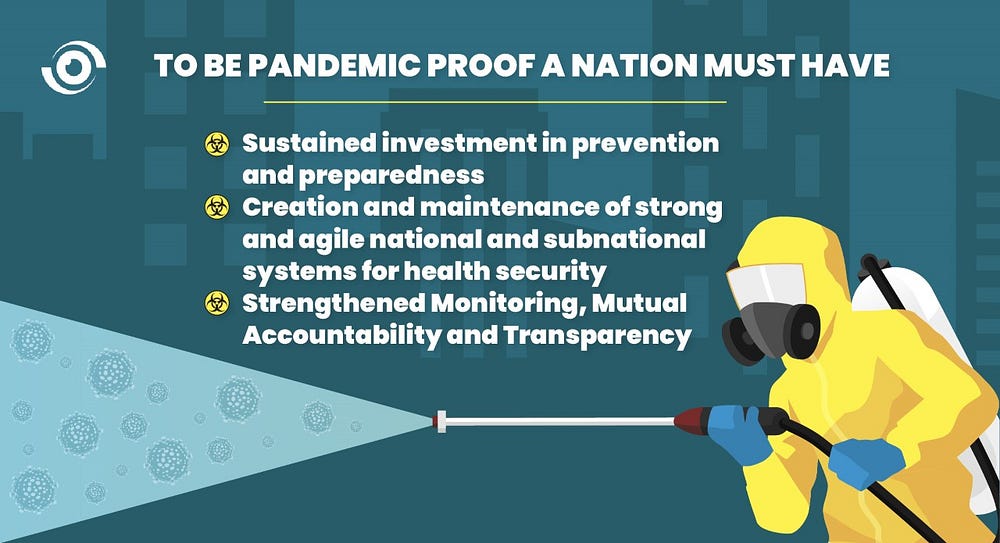By Sunday Oko and Ibukun Oguntola (Lead Writers)
The Federal Government Budget for the Health Sector has more than doubled over the past five years, increasing from N305.1 billion in 2016 to N876.4 billion in 2022. Now, for the first time in the history of health funding in Nigeria, over a trillion Naira has been allocated to the sector in the proposed 2023 budget; 53.61% higher than the amount allocated in 2022.
Although a far cry from the 15 percent agreed on in the Abuja Declaration, at 5.75% of the total budget this is the closest a national health budget has come in the 21 years since the Declaration.

However, this increase appears not to have translated to adequate funding for health security, as an analysis of all budget lines relating to health security from the past two years show a 13 percent decline in the 2023 proposed budget. A total of N5,175,527,623 was approved for health security in 2021; N8,870,922,330 in 2022 and N7,754,337,084 in 2023. Of note is the deficit shown in the proposed funds allocated to the National Action Plan on Health Security (NAPHS). Poor funding has been cited as one of the factors hindering the proper implementation of the plan.
With the ongoing Ebola outbreak in Uganda, the Cholera outbreak in Nigeria, the need to sustain Nigeria’s wild poliovirus free status and the constant threat of disease outbreaks, it is critical for the government to be deliberate about providing adequate funding to ensure the country can fund its health security needs.
Still learning lessons from the pandemic
The COVID-19 pandemic has shown the intense pressure disease outbreaks can place on health systems. It has also revealed the fact that health emergencies and weak health systems not only cost lives but pose some of the greatest social and economic risks ever experienced. Like every other country, there are crucial lessons from the pandemic Nigeria must learn which, if implemented, will remain relevant for years to come. However, for these lessons to be properly implemented, funding is key.
One of the declarations in the Singapore Statement on Global Health Security launched at the 2022 Global Health Conference clearly states that, ‘Governments must sustainably finance, build, strengthen, maintain and regularly practice preparedness and response capabilities that respect human rights, are inclusive, context specific, and adhere to relevant international law such as the International Health Regulations.’
This means that governments at all levels must dedicate adequate resources to respond to health emergencies and improve the overall response to public health threats. Government at the subnational level must ensure that subnational capacities for prevention, detection, and response are reinforced. This begins with them establishing a robust budget line for health security in their respective annual budgets.

Return on investment for health security
It is important to view these funds allocated to health security as investments and not a cost. It has been globally established that the return on investment for health security is immense. Investing as little as $5 per person per year globally can help ensure far better preparation for future pandemics. While the cost for disease prevention and preparedness is calculated in billions of dollars, the cost of a pandemic is in trillions. In its 2020 annual report, the Global Preparedness Monitoring Board revealed that it would take 500 years to spend as much on investing in preparedness as the world had lost due to COVID-19.
The pandemic and other disease outbreaks have served as a painful reminder that the country remains vulnerable to the continuous threat of infectious disease outbreaks and the existing health security architecture remains ill-equipped to finance pandemic prevention, preparedness, and response (PPR). The rationale for preventing and containing pandemics is self-evident: the price of preparedness is a fraction of the cost of responding to catastrophic outbreaks, both in terms of human and economic cost.

Making Nigeria ‘pandemic proof’
In addition to the need for increased and sustained funding for health security, other ways to make Nigeria pandemic proof include,
1. Creating and maintaining strong and agile national and subnational systems for health security: In 2018, Nigeria developed a costed National Action Plan for Health Security to strengthen the implementation of the International Health Regulation (IHR) core capacities, a costed multiyear roadmap for strengthening the nation’s health security.
However, there have been challenges in implementing the NAPHS due to low budgetary allocation to health security, and the poor allocation of funds for outbreak response. In addition, there are noticeable gaps in the commitment of the Ministries, Departments and Agencies (MDAs) directly involved in the implementation of the costed Plan.
There needs to be increased whole-of-government commitment to create and maintain existing systems, such as the NAPHS at the national and subnational levels, providing them with the required resources and support to maintain effective preparedness.
2. Engaged citizenship for health security: Community involvement must be prioritised in all preparedness efforts, building trust and engaging multiple stakeholders (e.g., legislators; representatives of the human and animal health, security, and foreign affairs sectors; the private sector; local leaders; and women and youth). Empowering civil society and the private sector, as well as long-term sustained community engagement can be crucial for detecting outbreaks early, controlling spread, ensuring trust and social cohesion, and fostering effective responses.
3. Strengthened monitoring, mutual accountability and transparency: Beyond allocating funds for health security, it is important to follow through and ensure that the funds are released and fully utilised. Independent monitoring of governance and implementation of health emergency preparedness and response systems can help drive improved service delivery, as well as improved value for money. Accountability systems must be enshrined in the epidemic preparedness and response systems at all levels as a leverage point for change.

The Pandemic Fund
On a global scale, the Pandemic Fund was officially launched in September 2022 in response to the call for critical investments to strengthen pandemic prevention, preparedness, and response capacities at national, regional, and global levels. The Fund is designed to make available additional, dedicated resources for pandemic prevention, preparedness, and response, motivate countries to increase investments, enhance coordination among partners, and serve as a platform for advocacy.
Investing in epidemic preparedness at the national and subnational levels is not an option. It is a necessity. A pandemic proof Nigeria is a nation that can rapidly detect outbreaks and ensure they do not spread further; limit the health, social and economic impacts of outbreaks when they do spread; ensure that all people have equitable access to quality health care and ensure that communities are resilient and recover quickly from health emergencies.
COVID-19 has shown that epidemics are inevitable and unpredictable. Preventing epidemics and building effective and strong health systems supports economic development, enables increased investment in health and brings Nigeria closer to achieving universal health coverage.


